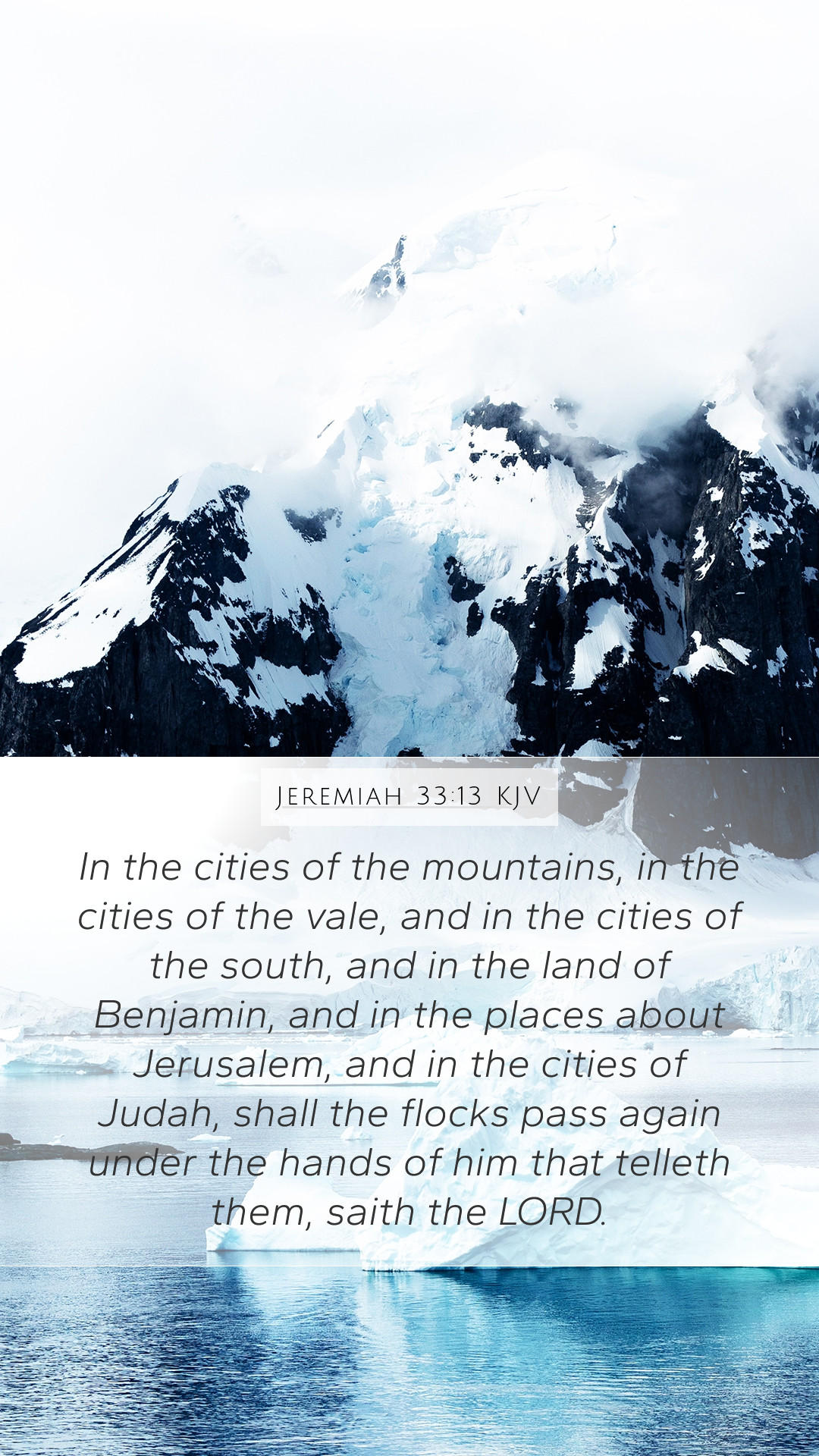Bible Verse Meaning: Jeremiah 33:13
Verse: "In the cities of the mountains, in the cities of the vale, and in the cities of the south, and in the land of Benjamin, and in the places about Jerusalem, and in the cities of Judah shall the flocks pass again under the hands of him that telleth them, saith the LORD." (Jeremiah 33:13, KJV)
Overview of Jeremiah 33:13
Jeremiah 33:13 is a promise from God concerning the restoration of His people Israel and the return of stability and prosperity. This verse emphasizes the geographical scope of God's restoration and highlights His intention to bless the cities of Judah after a period of calamity.
Commentary Insights
Matthew Henry's Commentary
Matthew Henry emphasizes that this verse points to God's faithfulness in fulfilling His promises. The "flocks" represent the people of Judah, indicating that they will return to their homeland and enjoy the security and provision from God. Henry underscores the hope embedded in this promise, which would resonate with those suffering in exile.
Albert Barnes' Commentary
Albert Barnes discusses the importance of the specific cities mentioned. He explains that the reference to "mountains," "vales," and "the south" illustrates the comprehensive nature of God’s restoration plan. Barnes notes that this indicates not only a physical return but also a spiritual revival, as the people would again experience the joy and responsibilities of tending to flocks, symbolizing a return to covenant blessings.
Adam Clarke's Commentary
Adam Clarke delves into the imagery of the passage, associating the flocks with God’s people who have been scattered. Clarke highlights that this verse is prophetic, indicating that God will gather His people with care and love. He also points out that this gathering signifies a return to a relationship with God that had been disrupted, emphasizing repentance and a willingness to serve the Lord anew.
Application for Bible Study Insights
This verse serves as a significant reminder of God’s mercy and pattern of restoration, making it relevant for both individual and group Bible studies. Here are some ways it can be applied in contemporary settings:
- Bible Study Groups: Discuss how God restores His people and the implications for believers today.
- Online Bible Study: Explore the historical context of exile and restoration in Judah, and what it teaches us about God's character.
- Bible Study Tools: Use maps and historical data to visualize the locations mentioned in the verse for a deeper understanding.
- Bible Study Resources: Incorporate theological discussions on the significance of God’s covenant with Israel and its relevance to the church.
- Bible Study Guides: Create lesson plans focusing on themes of hope, restoration, and God’s faithfulness found in the book of Jeremiah.
In-Depth Bible Verse Analysis
To effectively understand this verse in its broader context, consider the following:
- Historical Context: Reflect on the circumstances of the people during Jeremiah's time—exiled and longing for restoration.
- Character of God: Discuss God's unwavering commitment to His promises despite human failures.
- Symbolism: Analyze the symbolism of “flocks” and how it relates to God's guidance and providence for His people.
- Application of Biblical Truths: Consider what this verse teaches about God’s plans for His people and how it can apply to our lives today.
Cross References
This verse can be cross-referenced with:
- Isaiah 40:11: God as a shepherd returning His people.
- Ezekiel 34:11-16: The passage about God's shepherding care over His people.
- Jeremiah 29:10-14: God's plan and promise to restore His people after the exile.
- Psalm 23: The Lord as a shepherd and the restoration of His people.
- Hosea 11:11: The gathering of God’s people in the context of restoration.
Conclusion
In summary, Jeremiah 33:13 conveys a powerful message of restoration and hope. It serves as a reminder that God is faithful in His promises and that He desires to bring His people back into communion with Him. This understanding is vital for Christians seeking to apply Scripture to their lives today.
This commentary on Jeremiah 33:13 is a tool for deeper Bible verse understanding and can enhance both personal Bible study and group discussions focused on restoration themes found throughout the Bible.


